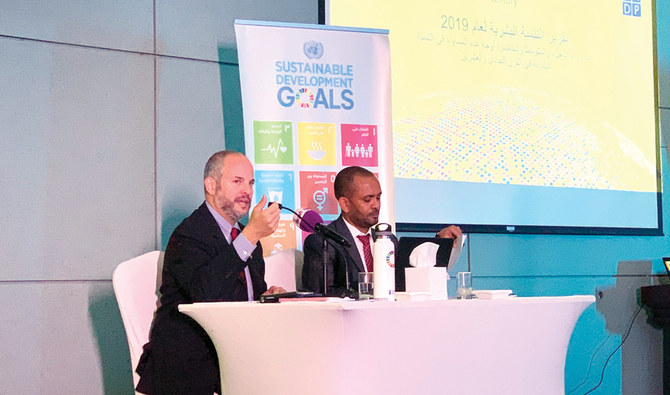RIYADH: Saudi Arabia has been ranked 36th in the world in a UN Development Program (UNDP) study highlighting the growth of global inequality.
The 2019 Human Development Report has warned that business as usual would not solve a new generation of inequalities.
While great strides had been made in fighting poverty, hunger and disease, many societies were still not working as they should, the report’s findings showed.
As a result, a new generation of inequalities was opening up around education, technology and climate change which if left unchecked could trigger a “new great divergence” in society of the kind not seen since the industrial revolution nearly two centuries ago, its authors concluded.
The UN produces the report on an annual basis to measure countries’ progress beyond economic growth and this year’s document was titled “Beyond income, beyond averages, beyond today: Inequalities in human development in the 21st century.”
As well as analyzing inequalities the report proposed a range of policy options to tackle them.
The UN listed Saudi Arabia 36th out of 189 countries and territories in its human development index (HDI), considered to be a high category placing.
With Saudi Arabia gearing up to host the 2020 G20 summit of world leaders, Adam Bouloukos, the Kingdom’s resident representative at the UNDP, said: “We are in a moment of time which is unique.”
Having taken over the presidency of the G20, he said the Kingdom had already “come out shining” from the meetings it had hosted in preparation for the November gathering in Riyadh.
Bouloukos said that the UN report tried to look at inequities in different ways.
He pointed out that conflicts, wars, and terrorist incidents had enormous growth impact on economies and countries in continual turmoil were experiencing long-term development issues.
Saudi Arabia had an important role in helping the world to tackle these problems which were being discussed during the G20 meetings, he added.
One of the reasons Saudi Arabia had not been placed higher in the index was because of the challenges that still lay ahead. However, Bouloukos pointed out that while the transformations taking place in the Kingdom had been noted, there was a time lag in the report and next year the full extent of the changes would be recognized.
While the report was global in scope, its data and findings can be unpacked at regional level to identify contours of inequality across world regions.
The Arab states region had experienced significant growth in human development over the past two decades, as measured through the report’s index. But according to the HDI and its sister list, the 2019 inequality-adjusted human development index (IHDI), the unequal distribution of education, health and living standards had stymied progress in the region, with up to 24 percent of its human development value lost when adjusted for inequality.
Gender inequality and vulnerability to conflict persisted in the region, figures showed.
Describing the “next-generation” inequalities likely to impact development progress, the report noted, for example, that in countries with very high levels of human development, subscriptions to fixed broadband were growing 15 times faster, and the proportion of adults with tertiary education was growing more than six times faster than in countries with low human development.
The HDI recorded a 14 percent gap in human development between men and women in the Arab states’ region. Whereas worldwide the share of non-farming employment for women was 39 percent, that figure fell to just 16 percent for the region. It also had one of the widest gaps in the world for women’s labor force participation, as well as one of the lowest percentages of women with access to banking services.
Vulnerability to conflict or crisis had also rolled back the region’s human development progress, with new data showing that Syria had lost 15 percent of its value on the HDI since 2010, and Libya has shed 10 percent in the same period. Since 2014, Yemen had lost 8 percent of progress by this measure, rounding out research commissioned by UNDP Yemen which showed that the country’s human development had been pushed back by 21 years due to the ongoing conflict.
The UN report recommended policies that looked at, but also went beyond, income, anchored in lifespan interventions starting even before birth, including through pre-labor market investments in young children’s learning, health, and nutrition. Such investments must continue through a person’s life, over the course of working years and into retirement and old age, it said.
The report further argued that taxation could not be examined in isolation, but must be part of a system of policies, including those for public spending on health, education, and alternatives to a carbon-intensive lifestyle.
Averages concealed the dynamics in society which really mattered to people, the study stated, and while they could be helpful in telling the bigger story, much more detailed information was needed to create policies to tackle inequality effectively.
Looking beyond today, the report asked how inequality could change in the future, particularly through the lens of climate change and technological transformation — two forces that seemed set to shape human development outcomes into the next century.
Environmental sustainability remained a challenge for the region, which registered the world’s lowest rate of renewable energy consumption.


























